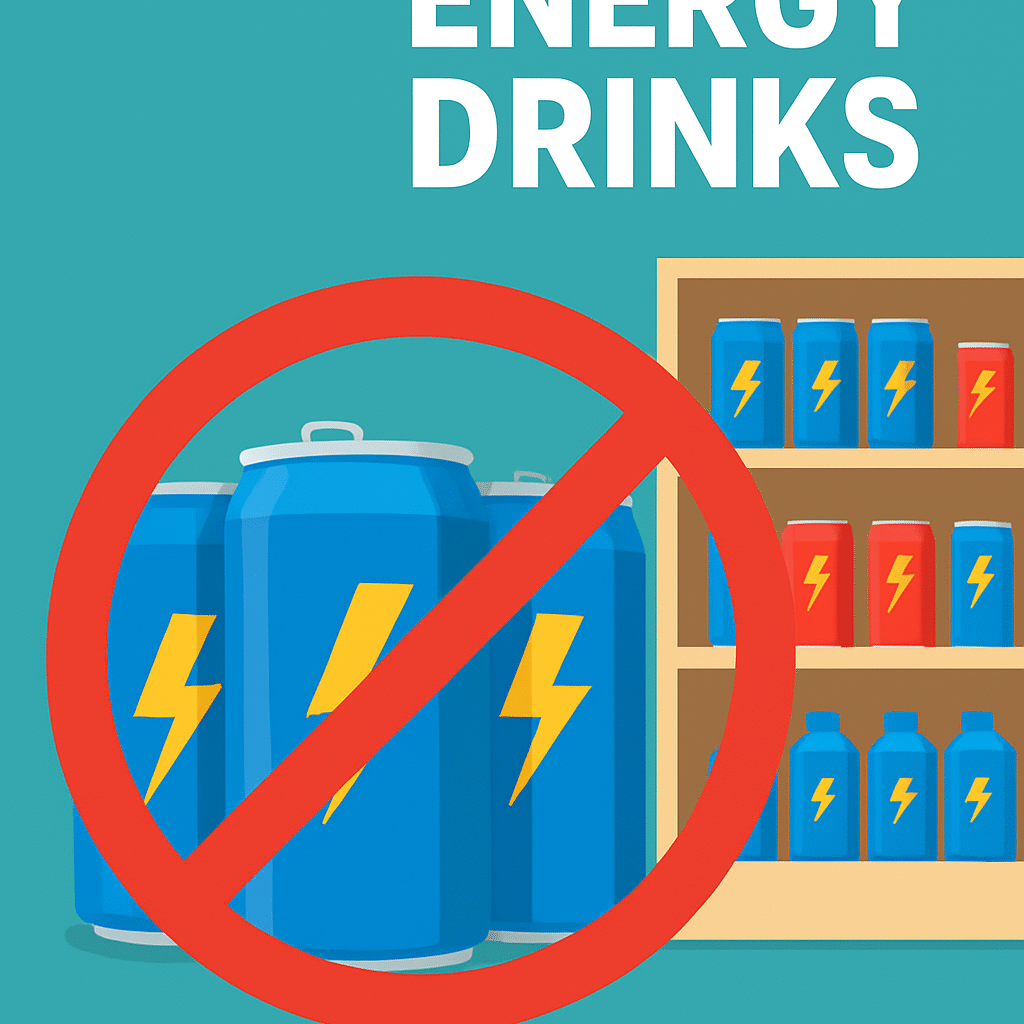Written and Reviewed By: Pharmacally Medical News Desk
The UK government has announced plans to ban the sale of high-caffeine energy drinks to children under 16 in England. The proposal, now open for public consultation, aims to reduce health risks linked to excessive caffeine consumption in young children.
If approved, the new law will make it illegal to sell energy drinks containing more than 150 mg of caffeine per litre to anyone less than 16 years of age. The ban will apply across all points of sale, including supermarkets, convenience stores, cafes, restaurants, vending machines, and online platforms.
Research shows that large amounts of caffeine can affect children’s physical and mental health. Reported problems include:
- Sleep disturbances
- Anxiety and irritability
- Difficulty concentrating in school
- Headaches and stomach aches
- Higher risks of obesity and dental damage
A government review found that nearly one in three children in the UK consumes energy drinks weekly, and about 100,000 children drink at least one every day.
A global review found that 55% of people had tried energy drinks at some point. About 43% used them in the last year, and 22% had one in the past week. Around 9% drink them daily.
In Finland, weekly use among teens rose from 18.2% in 2014 to 24.4% in 2018.
A scoping review found 73 countries use food policy tools like taxes, school bans, sales limits, or warnings to curb energy drink use among children and teens.
The ban is based on strong evidence. A systematic review of 57 studies involving more than 1.2 million young people worldwide linked high energy drink use to poor sleep, mood problems, lower academic performance, and even higher risks of self-harm.
In the US in 2017, a 16-year-old high school student in South Carolina died from a caffeine-induced heart problem after consuming a soda, a latte, and an energy drink within two hours. He had no health conditions before.
Although many supermarkets introduced voluntary restrictions on energy drink sales to children in 2018, reports showed that under-16s children could still access these products in some shops. The government now plans to shift from voluntary action to enforceable regulation.
Trading standards officers will oversee compliance. Retailers caught selling high-caffeine drinks to children could face fines under existing food safety laws. Serious or repeated violations could result in criminal charges.
The consultation is also considering whether vending machines should be required to remove high-caffeine energy drinks altogether, similar to the restrictions once placed on cigarette machines
A recent article in The BMJ welcomed the government’s move, noting that it is well supported by scientific evidence. However, experts also pointed out that while the ban may protect children’s mental and physical wellbeing, its effect on childhood obesity may be limited. Obesity is influenced by multiple factors such as diet, exercise, and social environment, and cannot be solved by caffeine restriction alone.
The consultation process will gather views from the public, schools, retailers, manufacturers, and health experts before the law is finalized. If implemented, England would join other countries such as Lithuania and Latvia, which already restrict the sale of energy drinks to children.
The proposed ban highlights growing concern over the impact of high-caffeine drinks on young people. While it may not be a complete solution to childhood obesity, it represents a significant step in protecting the health and wellbeing of children in England.
Reference
Mahase E. Energy drinks ban: Experts welcome government action for under 16s but question obesity claims BMJ 2025; 390:r1862 doi:10.1136/bmj.r1862
No place in children’s hands’: under-16s in England to be banned from buying energy drinks, The Guardian, 02 Sept 2025, https://www.theguardian.com/business/2025/sep/02/children-energy-drinks-government-obesity-health?utm_source=chatgpt.com
Banning the sale of high caffeine energy drinks to children’s, 03 September 2025, gov.uk, https://www.gov.uk/government/consultations/banning-the-sale-of-high-caffeine-energy-drinks-to-children/banning-the-sale-of-high-caffeine-energy-drinks-to-children
Puupponen M, Tynjälä J, Tolvanen A, Välimaa R and Paakkari L (2021) Energy Drink Consumption Among Finnish Adolescents: Prevalence, Associated Background Factors, Individual Resources, and Family Factors. Int J Public Health 66:620268. doi: 10.3389/ijph.2021.620268
Rostami, M., Babashahi, M., Ramezani, S. et al. A scoping review of policies related to reducing energy drink consumption in children. BMC Public Health 24, 2308 (2024). https://doi.org/10.1186/s12889-024-19724-y
A High School Student’s Death Was Caused By Too Much Caffeine, The Coroner Says, 16 May 2027, Time, https://time.com/4780145/caffeine-death-teen-south-carolina/?utm_source=chatgpt.com

